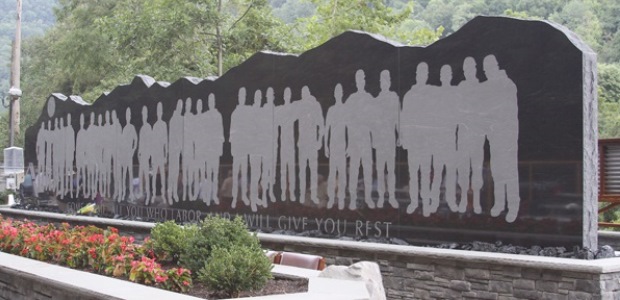
Don Blankenship Sentenced to Prison Term
The former CEO of Massey Energy, a subsidiary of which owned the Upper Big Branch South mine when a methane explosion killed 29 miners on April 5, 2010, was sentenced April 6 to a year in federal prison and ordered to pay a $250,000 fine.
Don Blankenship, former CEO of Massey Energy, a subsidiary of which owned the Upper Big Branch South mine near Whitesville, W.Va., when a methane explosion killed 29 miners on April 5, 2010, was sentenced April 6 to a year in federal prison and ordered to pay a $250,000 fine. A jury in a Charleston, W.Va., federal courtroom convicted Blankenship last Dec. 3 of conspiracy to willfully violate federal mine health and safety standards, with U.S. Attorney Booth Goodwin saying he hoped the case "will make a difference throughout the country."
Alpha Natural Resources acquired the mine in June 2011 by buying Massey and announced in April 2012 that it would not reopen the mine.
Acting U.S. Attorney Carol Casto announced the sentence; at trial, Blankenship had been acquitted of two other charges, securities fraud and making false statements.
"This sentence is a victory for workers and workplace safety. It lets companies and their executives know that you can't take chances with the lives of coal miners and get away with it," Casto said. "Putting the former chief executive officer of a major corporation in prison sends a message that violating mine safety laws is a serious crime and those who break those laws will be held accountable."
In a statement, U.S. Labor Secretary Thomas E. Perez said the sentence "proves that no mine operator is above the law and should send a strong signal to unscrupulous employers that skirt safety rules. No prison sentence and no amount of money can bring back the 29 men who lost their lives at Upper Big Branch," he added, "but my sincere hope is that this sentence can offer some measure of closure for the families of those miners. That said, this is a clear case of the punishment not fitting the crime. This sentence is the maximum allowable under the law but, regrettably, the criminal provisions of the Mine Act are far too weak to truly hold accountable those who put miners' lives at risk. This administration continues to support efforts in Congress to strengthen those penalties, and we stand ready to work with members who believe that no worker should lose their life for a paycheck."
United Mine Workers of America International President Cecil E. Roberts agreed. "I am gratified that Don Blankenship was found guilty of violating mine safety laws and that he received the maximum sentence available for that crime. However, it is outrageous that the most time in prison he can receive as a punishment is one year," he said in his statement on the sentence. "There were 52 people killed at Massey mines while he was CEO of that company. The penalty he has received means he will get one week per death. That's a travesty. He orchestrated a scheme to evade mine safety laws, impede enforcement of those laws, provide false information to federal safety inspectors, and more, all of which put every miner who worked on any Massey property at risk of losing their lives every day they went to work. Far too many of them did, 29 on one terrible day six years ago. Don Blankenship deserves to go to jail, for that is surely where he belongs. And although this sentence will not begin to make him atone for his crimes, there is a higher court he will answer to someday, and I have complete faith that the justice he receives there will be more than adequate."
"Today's sentence marks the culmination of a comprehensive joint investigation that took over five years to complete and resulted in five criminal convictions," said Special Agent in Charge Scott S. Smith of the FBI's Pittsburgh Field Office. "Along with dedicated prosecutors in the U.S. attorney's office and investigators in United States Department of Labor's Office of Inspector General, the FBI is committed to holding those who commit crimes by enabling safety violations and who place profits above the value of human life accountable."
The investigation also brought about Alpha's agreement to pay more than $200 million after it acquired Massey to establish a foundation dedicated to mine safety and health research, as well as set aside nearly $50 million in funding for the foundation.